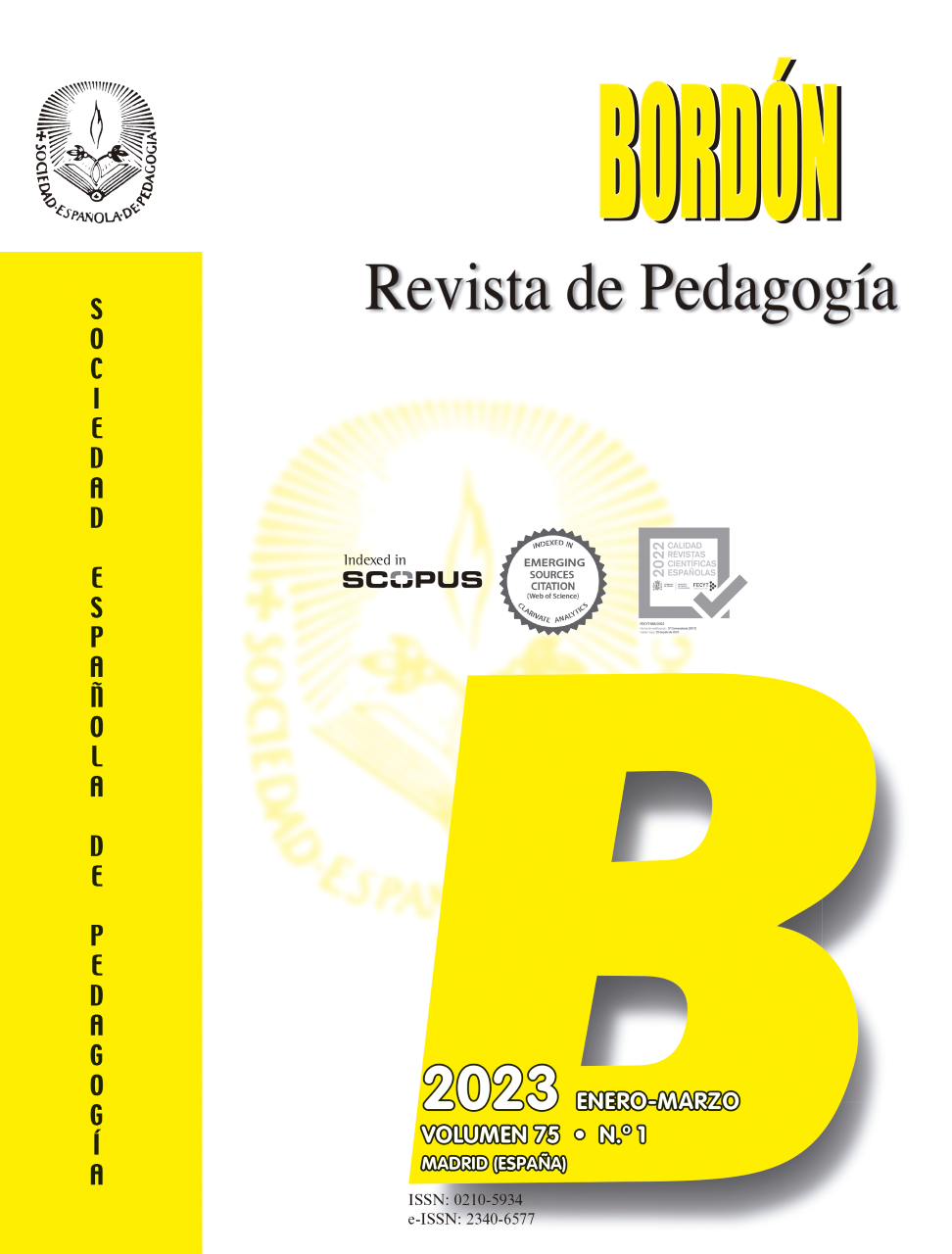Professional teaching atmosphere in high schools
Main Article Content
Abstract
Work environment is a key component in organisations because it influences the quality of teaching-learning processes and their impact. We wanted to delve deeper into this construct from empirical research that has been initiated in the Principality of Asturias in the academic year 2017-2018 and which we report periodically. It begins with an INTRODUCTION where an updated review of the areas and tools used is made, from which we have built an instrument adapted to our reality. It is a mixed METHOD, due to an ad hoc questionnaire that has been applied to assess the perceptions of a sample of 1,906 teachers out of a population of 4,581, which includes a Likert scale complemented with open questions. Quantitative data were analysed with SPSS.23, STATA 14, and content analysis with AQUAD 8, with the intention of delimiting segments of meaning and to establish categories, codes, catalogues and meta-codes. The RESULTS show the value of interpersonal relations in improving the professional climate, highlighting in the DISCUSSION those indicators that are perceived as most negative, i.e., the intensification of work due to systematic bureaucracy, ongoing educational reforms, the low social recognition of teaching and the absence of a professional career associated with good teaching performance, among others. Improvement is linked to an adequacy of working hours, reduction in bureaucracy, pact for education, a profound revision of the professional promotion system, multidisciplinary work, initial quality and continuous training and greater social recognition of the teaching profession.
Downloads
Article Details

This work is licensed under a Creative Commons Attribution-NonCommercial 4.0 International License.
References
Álvarez-Arregui, E. (2021). El valor de los ecosistemas de formación para el desarrollo de una educación inclusiva sostenible. En N. H. Mondragón, M. D. Santamaría, O. Leonet Sieso y M. Belasko Txertudi (coords.), ¡Hablemos de inclusión! Buenas prácticas comunicativas en educación (pp. 9-38). Graó.
Álvarez-Arregui, E. y Arreguit, X. (2019). The future of the university and the university of the future. Ecosystems of continuous training for a learning and teaching society sustainable and responsible. Aula Abierta, 48(4), 447-480.
Arreguit, X. y Hugues, J. F. (2019). Competences and education for tomorrow’s jobs and challenges: a company’s perspective. Aula Abierta, 48(4), 373-392. https://doi.org/10.17811/rifie.48.4.2019.373-392
Baeza, S. (2005). Funcionamiento y clima sociorelacional del aula. Una perspectiva sistémica: una escala sistémica de observación de clases. Aprendizaje Hoy.
Balaguer, I., Castillo, I., Ródenas, L., Fabra, P. y Duda, J. L. (2015). Los entrenadores como promotores de la cohesión del equipo. Cuadernos de Psicología del Deporte, 15(1), 233-242.
Burbano-Ronquillo, M. B., Alulema-Pérez, N. G., Villares-Jinez, P. E. y Gody-Arce, W. A. (2020). Liderazgo, management y su impacto en el clima organizacional. Polo del Conocimiento. Revista Científico-Profesional, 5(2), 153-178. https://dx.doi.org/10.23857/pc.v5i2.1259
Bustamante-Ubilla, M. A. y Álvarez, A. J. (2019). Validación de un cuestionario de clima organizacional para organizaciones de salud. Revista Gerencia y Políticas de Salud, 18(36). https://doi.org/10.11144/Javeriana.rgsp18-36.vcco
Cabero, J. y Barroso, J. (2013). La utilización del juicio de experto para la evaluación de TIC: el coeficiente de competencia experta. Bordón, 65(2), 25-38. https://recyt.fecyt.es/index.php/BORDON/article/view/brp.2013.65202
Collell, J. y Escudé, C. (2006). Maltrato entre alumnos (I). Presentación de un cuestionario para evaluar las relaciones entre iguales. CESC conducta y experiencias sociales a clase. Ámbitos de Psicopedagogía, 18, 8-12. http://www.xtec.cat/~cescude/BZAP%20181.pdf
Haynes, N. M., Emmons, C. L. y Benavie, M. (1997). School climate as a factor in student adjustment and achievement. Journal of Educational and Psychological Consultation, 8, 321-329. https://doi.org/10.1207/s1532768xjepc0803_4
Hoy, W. K. y Feldman, J. A. (1999) Organizational health profiles for high schools. En H. J. Freiberg (ed.), School climate: measuring, improving and sustaining healthy learning environments (p. 85). Falmer Press.
Kelley, E. A. (1989). Improving school climate. Practitioner, 15(4), 1-5.
Mcmillan, J. H. y Schumacher, S. (2005). Investigación educativa. Pearson Educación.
Mejías, A., Reyes, S. y Arzola, M. (2006). Medición del clima organizacional en instituciones de educación superior. Universidad, Ciencia y Tecnología, 10, 55-61. http://ve.scielo.org/scielo.php?script=sci_arttext&pid=S1316-48212006000200002
Mosqueda, S., Ródenas-Cuenca, L. T., Balaguer, I., Salcido-Otañez, Y. E. y López-Valle, J. M. (2022). Diferencias demográficas de climas motivacionales, necesidades psicológicas básicas y cohesión en jóvenes (Demographic differences in motivational climates, basic psychological needs and cohesion in young people). Retos, 43, 613-622. https://doi.org/10.47197/retos.v43i0.88608
Pedraza-Melo, N. A. (2020). El clima y la satisfacción laboral del capital humano: factores diferenciados en organizaciones públicas y privadas. Innovar: Revista de Ciencias Administrativas y Sociales, 30(76), 9-24. https://doi.org/10.15446/innovar.v30n76.85191
Pérez, A., Ramos, G. y López, E. (2009). Diseño y análisis de una escala para la valoración de la variable clima social aula en alumnos de educación primaria y secundaria. Revista de Educación, 350, 221-252. https://www.educacionyfp.gob.es/revista-de-educacion/numeros-revista-educacion/numeros-anteriores/2009/re350/re350-10.html
Prado-Morales, M. del (2018). Clima motivacional de la familia: evaluación e intervención. [Tesis doctoral, Universidad Autónoma de Madrid]. https://repositorio.uam.es/bitstream/handle/10486/686654/prado_morales_mirtha_del.pdf?sequence=1
Rodríguez, M. D. (2005). Diagnóstico organizacional. Ediciones Universidad Católica de Chile. Rodríguez-Mantilla, J. M. y Fernández-Díaz, M. J. (2015). Diseño y validación de un instrumento de medida del clima en centros de educación secundaria. Educación XX1, 18(1), 71-98. https://doi.org/10.5944/educxx1.18.1.12312
Soria-Reséndez, A. C., Pedraza-Melo, N. A. y Bernal-González, I. (2019). El clima organizacional y su asociación con la satisfacción laboral en una institución de educación superior. Acta Universitaria, 29, 1-14. https://doi.org/10.15174/au.2019.2205
Tavares-Chiavone, F. B., Filgueira-Martins, C. C., De Lima-Ferreira, N., Cándido-de Oliveira-Salvador, P. T., Santos-Becerril, M. y Euzébia-Pereira-Santos, V. (2021). Clima organizativo en una unidad de cuidados intensivos: percepción del equipo de enfermería. Enfermería Global: Revista Electrónica Trimestral de Enfermería, 20(2), 390-425. https://doi.org/10.6018/eglobal.427861
Trianes, M. V., Blanca, M. J., De la Morena, L., Infante, L. y Raya, S. (2006). Un cuestionario para evaluar el clima social del centro escolar. Psicothema, 18(2), 272-277. https://www.psicothema.com/pi?pii=3209

